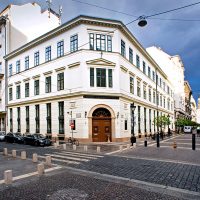
Last week has been unprecedented in the history of the Central European University (CEU) — it was reported in the most prestigious media outlets such as The Guardian, The New York Times, Bloomberg, The Financial Times and many others. The reason for such an uproar is the tabled legislation in the Hungarian Parliament which would effectively make the operation of CEU in Budapest impossible.
The way CEU reacted reflects the leadership style of Michael Ignatieff who proved to be politically alert and enterprising, a quality rarely found in academics. In the times when rectors are usually appointed as managers and often come from the private sector, the decision to put Ignatieff in lead reflects a unique position of CEU in the liberal world of universities. It is undoubtedly this understanding of the importance of the “academic freedom” by Ignatieff the academic, that pushed him to react in such a broad and intense manner effectively invoking all available remedies to oppose the draft legislation. The media coverage, the diplomatic pressure from the US Embassy, the global academic movement garnered in support of CEU — CEU will win regardless of the outcome of the decision. It has already benefited from the unprecedented publicity and I would say it is perhaps a leader in the world in terms of combining academic excellence and societal engagement. It is an institution of highest quality you frankly do not find anymore in Europe. There is space to think and explore and there is money for scholarships with no immediate career pressures. As a Ph.D. student at CEU, I spent 4 and a half years researching a topic making use of an excellent library, world class speakers visiting the University (such as Bruno Latour, Joseph Stiglitz and many others) and taking up an opportunity to spend a year at the Oxford University in 2007/2008 — a unique opportunity open to CEU students in cooperation with the Opean Society Institute and the British Council. I did not publish articles while at CEU, but instead, I read broadly, made friends with people from dozens of countries and matured as a person and an academic. CEU is truly special in the way it triggers critical thinking that few other universities do.
Some time ago I reviewed an essay of Edward Said titled “On Defiance and Taking Positions”. It is about the role of a public intellectual in our society. The essay starts with the following paragraph:
Compared, say, to most African, Asian, and Middle Eastern Universities, the American university constitutes a relatively utopian space, where we can actually talk about the boundaries of the academy. In other universities in other parts of the world, of course, the academy is part of the political system and academic appointments are necessarily, very often the case, outright political appointments.
It is precisely this type of independence from political appointments that Orban is trying to end in a country which is becoming increasingly authoritarian. Edward Said goes on to establish the role of an intellectual in society in a following manner:
But I think, once you get out of the academy into the larger world, then the intellectual plays a particular role, and this role is essentially — it is perhaps easier to define it in terms of negatives — an opponent of consensus and orthodoxy, particularly at a moment in our society when with authorities of concerns and orthodoxy are so powerful, and the role of the individual, the voice of the individual tend not to be heard. So the role of the intellectual is not to consolidate authority, but to understand, interpret, and question it: this is another version of the notion of speaking the truth to power, a point I make in my book Representations of the Intellectual.
And then perhaps the most important is the following sentence of Edward Said:
There’s nothing more maddening in our own time than people who say, “Oh no, no, that’s controversial; I don’t want to do it”; or the habitual trimming refrain, “No, no, I can’t sign that because I mean, you know, I may disturb matters and people may think the wrong thing about me”.
It is this type of public intellectuals which this world needs and increasingly lacks, and CEU was a place to cultivate and empower such voices. This is why Orban closes it. And the same reason was at play when Erdogan closed universities and fired professors and deans, Putin closed the European Humanitarian University, Aliyev closed the Qafqaz University and many other leaders push universities in their own countries to comply, academics to keep quiet and become professionals instead of being intellectuals.
The Central European University is a fore-post against such attempts, an institution that is essential for an open society, for democracy, even for public memory to be preserved in the times when every authoritarian leader attempts to write his/her own history. CEU is not fighting for itself, it is fighting for the future of universities in the world. As simple as that.